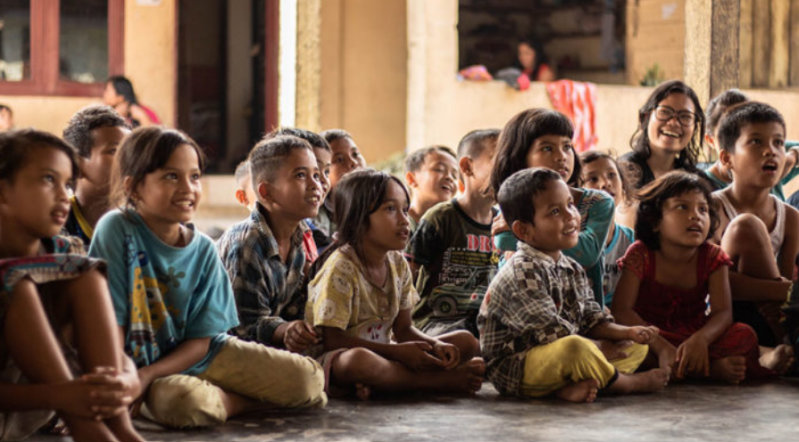
The National Association of Evangelicals is urging Christians to unite in support of “life-saving foreign aid” through a new petition it plans to present to lawmakers next month.
The campaign, titled Compassion for a World in Need, emphasizes that Christians have historically “led efforts to care for the world’s most vulnerable — feeding the hungry, clothing the poor and serving those in need as an expression of Christ’s love.”
With the future of U.S. foreign assistance “at a pivotal crossroads,” the NAE says, evangelicals need to speak with one voice in backing poverty-focused international aid and the role of faith-based partners in delivering it.
NAE President Walter Kim plans to meet with members of Congress in early September to present the statement, accompanied by 500 signatures, “to show evangelicals’ support to protect life-saving foreign aid,” according to an Aug. 6 udpate from the NAE.
“For thousands of years, Christians have led the way in responding to human suffering around the world,” the statement says. “Guided by Scripture and driven by compassion, the Church has fed the hungry, clothed the poor and cared for the orphan and the widow — embodying Christ’s call to serve the most vulnerable. This legacy of faith and service continues in the United States, where public and faith-based organizations have long partnered together to love and support our global neighbors in need.”
The NAE says the current Compassion for a World in Need statement has been revised for a broader audience, following an earlier draft adopted by its board in March 2025.
The following is the full NAE statement:
We invite you to join in the call for greater Compassion for a World in Need.
For God so loved the world that he gave his one and only Son, that whoever believes in him shall not perish but have eternal life’ (John 3:16).
This beloved verse captures the heart of evangelical faith: the firm conviction that God loves every human being and offers eternal salvation to all who place their trust in Jesus. As Jesus’ followers we emulate his generosity and love for our neighbors in need, across all barriers of race, ethnicity, nationality or geography.
For two thousand years, Christians have obeyed Jesus’ command to go into all the world, preaching the gospel in word and deed, and making disciples of all nations. We honor the dignity of God’s image in all people, uphold the sanctity of every human life, and embrace the call to show compassion for the orphan, the widow and the vulnerable wherever they are found.
As citizens in a country blessed with abundance and unparalleled global influence, we also recognize the responsibility to steward our nation’s resources in a way that leads to a more peaceful and prosperous world. Such a world contributes to our national flourishing and security.
But more is at stake than our own security and prosperity. Jesus taught that “[f]rom everyone who has been given much, much will be demanded; and from the one who has been entrusted with much, much more will be asked” (Luke 12:48).
We celebrate the millions of lives saved and the substantial contributions to human flourishing that have been achieved both in the United States and around the world through public and faith-based aid initiatives, often working in effective partnerships that respect the distinctive callings of governments and churches. The Bible offers multiple examples of public-private partnerships (Nehemiah 2:1–10, Ezra 1:1–8; Luke 7:1–6), and several Supreme Court decisions have established that government may not exclude faith-based groups when it partners with secular organizations.
But much more can and must be done. Millions of people die each year of preventable causes, and millions more live in extreme poverty. More than 100 million people have been displaced from their homes by wars, persecution and natural disasters. Our total U.S. poverty-focused response to these needs represents less than 1 percent of our national budget, and Americans give only about 0.1 percent of their personal income to international charities.
Christians are not utopians; we recognize that some aid programs have been ineffective or co-opted to promote values not shared by many Americans. These programs should be reformed or discontinued. We also understand that human suffering will persist until Christ returns. But this reality should spur us to greater engagement and generosity, not less. As the Apostle Paul urged the Corinthians:
Remember this: Whoever sows sparingly will also reap sparingly, and whoever sows generously will also reap generously. Each of you should give what you have decided in your heart to give, not reluctantly or under compulsion, for God loves a cheerful giver. And God is able to bless you abundantly, so that in all things at all times, having all that you need, you will abound in every good work (2 Corinthians 9:6–8).
Therefore, we call on all Christians to:
- Pray and give generously to support both evangelism and ministries of compassion, both at home and abroad;
- Advocate with members of Congress and the administration for poverty-focused international assistance, with a particular focus on partnership with effective faith-based charities; and
- Welcome, befriend and share the love of Jesus with immigrants and refugees in our communities.
The NAE is also calling upon Congress and the administration to:
- Undertake a review of foreign aid effectiveness in a way that does not hamstring current operations;
- Maintain support for poverty-focused international assistance and refugee resettlement, continuing to work with faith-based implementing partners wherever appropriate; and
- Articulate for the American people the compelling rationale for continued global engagement and U.S. leadership in international humanitarian and development cooperation and refugee resettlement.






